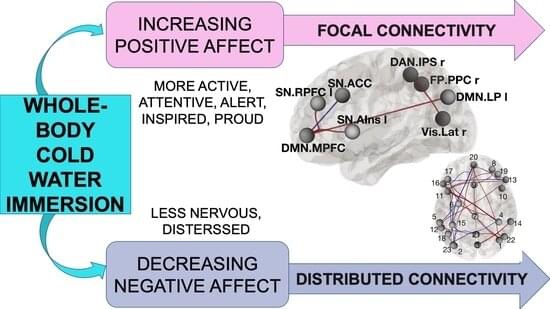𝐅𝐨𝐫 𝐭𝐡𝐞 𝐟𝐢𝐫𝐬𝐭 𝐭𝐢𝐦𝐞, 𝐚 𝐭𝐞𝐚𝐦 𝐨𝐟 𝐫𝐞𝐬𝐞𝐚𝐫𝐜𝐡𝐞𝐫𝐬 𝐡𝐚𝐬 𝐨𝐛𝐬𝐞𝐫𝐯𝐞𝐝 𝐜𝐡𝐚𝐧𝐠𝐞𝐬 𝐢𝐧 𝐡𝐨𝐰 𝐝𝐢𝐟𝐟𝐞𝐫𝐞𝐧𝐭 𝐩𝐚𝐫𝐭𝐬 𝐨𝐟 𝐭𝐡𝐞 𝐛𝐫𝐚𝐢𝐧 𝐢𝐧𝐭𝐞𝐫𝐚𝐜𝐭 𝐰𝐢𝐭𝐡 𝐞𝐚𝐜𝐡 𝐨𝐭𝐡𝐞𝐫 𝐚𝐟𝐭𝐞𝐫 𝐚 𝐩𝐞𝐫𝐬𝐨𝐧’𝐬 𝐛𝐨𝐝𝐲 𝐢𝐬 𝐢𝐦𝐦𝐞𝐫𝐬𝐞𝐝 𝐢𝐧 𝐜𝐨𝐥𝐝 𝐰𝐚𝐭𝐞𝐫. 𝐓𝐡𝐞 𝐟𝐢𝐧𝐝𝐢𝐧𝐠𝐬 𝐞𝐱𝐩𝐥𝐚𝐢𝐧 𝐰𝐡𝐲 𝐩𝐞𝐨𝐩𝐥𝐞 𝐨𝐟𝐭𝐞𝐧 𝐟𝐞𝐞𝐥 𝐦𝐨𝐫𝐞 𝐮𝐩𝐛𝐞𝐚𝐭 𝐚𝐧𝐝 𝐚𝐥𝐞𝐫𝐭 𝐚𝐟𝐭𝐞𝐫 𝐬𝐰𝐢𝐦𝐦𝐢𝐧𝐠 𝐨𝐮𝐭𝐬𝐢𝐝𝐞 𝐨𝐫 𝐭𝐚𝐤𝐢𝐧𝐠 𝐜𝐨𝐥𝐝 𝐛𝐚𝐭𝐡𝐬.
During a research trial, the results of which are published in the journal Biology, healthy volunteers were given a functional MRI (fMRI) scan immediately after bathing in cold water. These scans revealed changes in the connectivity between the parts of the brain that process emotions.
For the first time, a team of researchers has observed changes in how different parts of the brain interact with each other after a person’s body is immersed in cold water. The findings explain why people often feel more upbeat and alert after swimming outside or taking cold baths.
The research team from the University of Portsmouth, Bournemouth University and University Hospitals Dorset (UHD) recruited 33 volunteers for the trial.










Comments are closed.